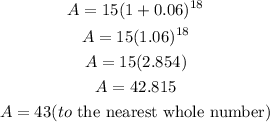From the question;
A sample of bacteria is growing at an hourly rate of 6%
This means
Rate of growth = 6%
The sample began with 15 bacteria
We are to find how many bacteria will be in the sample after 18 hours
This will be done by using exponential growth formula

Where
p = initial number of bacteria
r = rate of growth
t = time
A = new number of bacteria
From the question

Hence we have

By simplifying further we have

Therefore,
There will be 43 bacteria after 18 hours